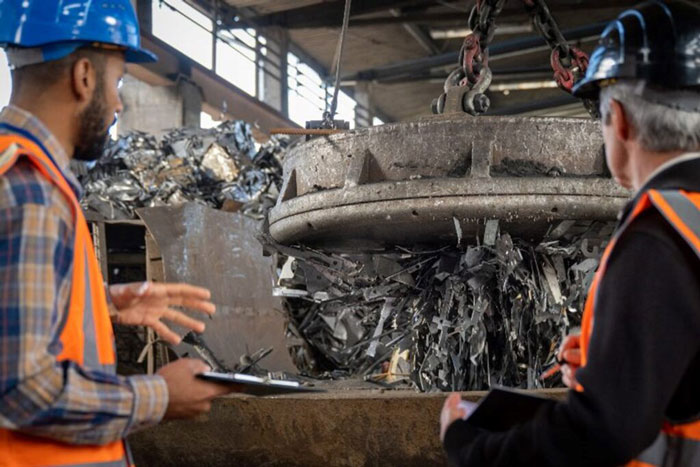5901 Botham Jean Blvd, Dallas, TX 75215
How are Magnets Used in the Recycling Industry?
May 23, 2024Harnessing the Power of Magnets

Recycling is an important aspect of modern waste management, aiming to reduce landfill use and conserve natural resources. Among the various technologies employed in recycling, magnets play a pivotal role in efficiently separating materials. This blog answers the question “How are magnets used in recycling?”, detailing their application in recycling factories and the broader industry.
The Role of Magnets in Recycling
So, how do we use magnets in recycling? Magnets are instrumental in recycling processes due to their ability to attract ferrous metals, such as iron and steel, from mixed waste streams. This separation is crucial for ensuring that these metals are recovered and reused rather than ending up in landfills. The efficiency and simplicity of using magnets make them a preferred choice in the recycling industry.
The Use of Magnets in Recycling Factories
Now, how are magnets used in recycling factories? In recycling factories, magnets are deployed in several stages to enhance the sorting process. Here’s a detailed look at how magnets are used in recycling factories:
- Conveyor Belt Systems: One common method is incorporating magnets above or below conveyor belts carrying mixed waste. As the waste moves along the belt, the magnet attracts ferrous metals, pulling them out of the stream. This method is particularly effective in large-scale operations where rapid sorting is necessary.
- Drum Magnets: These are rotating drums with a magnetic core, installed at the end of conveyor belts. As waste passes through, the drum magnet attracts and lifts ferrous metals from the waste stream, depositing them into a separate collection area. This continuous process allows for efficient separation without interrupting the flow of waste.
- Overband Magnets: Suspended over conveyor belts, overband magnets use powerful magnetic fields to extract ferrous metals from the moving waste below. These magnets are particularly useful for handling bulky and irregularly shaped items, ensuring that even large metal objects are effectively removed from the waste stream.
Innovations in Magnetic Technology for Enhanced Recycling Efficiency
Beyond traditional applications, innovations in magnetic technology continue to expand how magnets can be used in recycling. For instance, the development of rare-earth magnets, which are significantly stronger than traditional magnets, has enabled the separation of smaller and more challenging metal particles. Additionally, the integration of magnetic separation with other technologies, such as eddy current separators, has enhanced the recovery of non-ferrous metals like aluminum and copper.
The Role of Magnets in Sustainable Recycling Practices
The practical use of magnets in recycling involves both established methods and ongoing advancements. For example, at recycling plants, waste is first sorted manually or with automated systems to remove large non-metallic items. Subsequently, magnetic separators come into play, extracting ferrous metals efficiently.
Additionally, in electronic waste recycling, where small and complex components abound, magnets are used to recover valuable metals from shredded electronic scrap. This not only aids in recycling precious resources but also prevents hazardous materials from contaminating the environment.
Embrace the Power of Magnets in Recycling with Okon Recycling
Now that we’ve answered the question “How can magnets be used in recycling?” you should have a better understanding of their indispensable role in modern waste management. Magnets used in recycling enable the efficient recovery of ferrous metals, contributing to sustainability efforts by minimizing waste and reducing the need for raw materials. As technology progresses, the ways in which magnets can be used in recycling are likely to expand, further enhancing the efficiency and effectiveness of recycling processes. Okon Recycling, serving Dallas-Fort Worth with over a century of expertise and commitment to innovation, invites you to join us in leveraging these advanced technologies. Contact us today, online, or at 214-426-6566, and discover how we can drive sustainable solutions and build a greener future for all.
